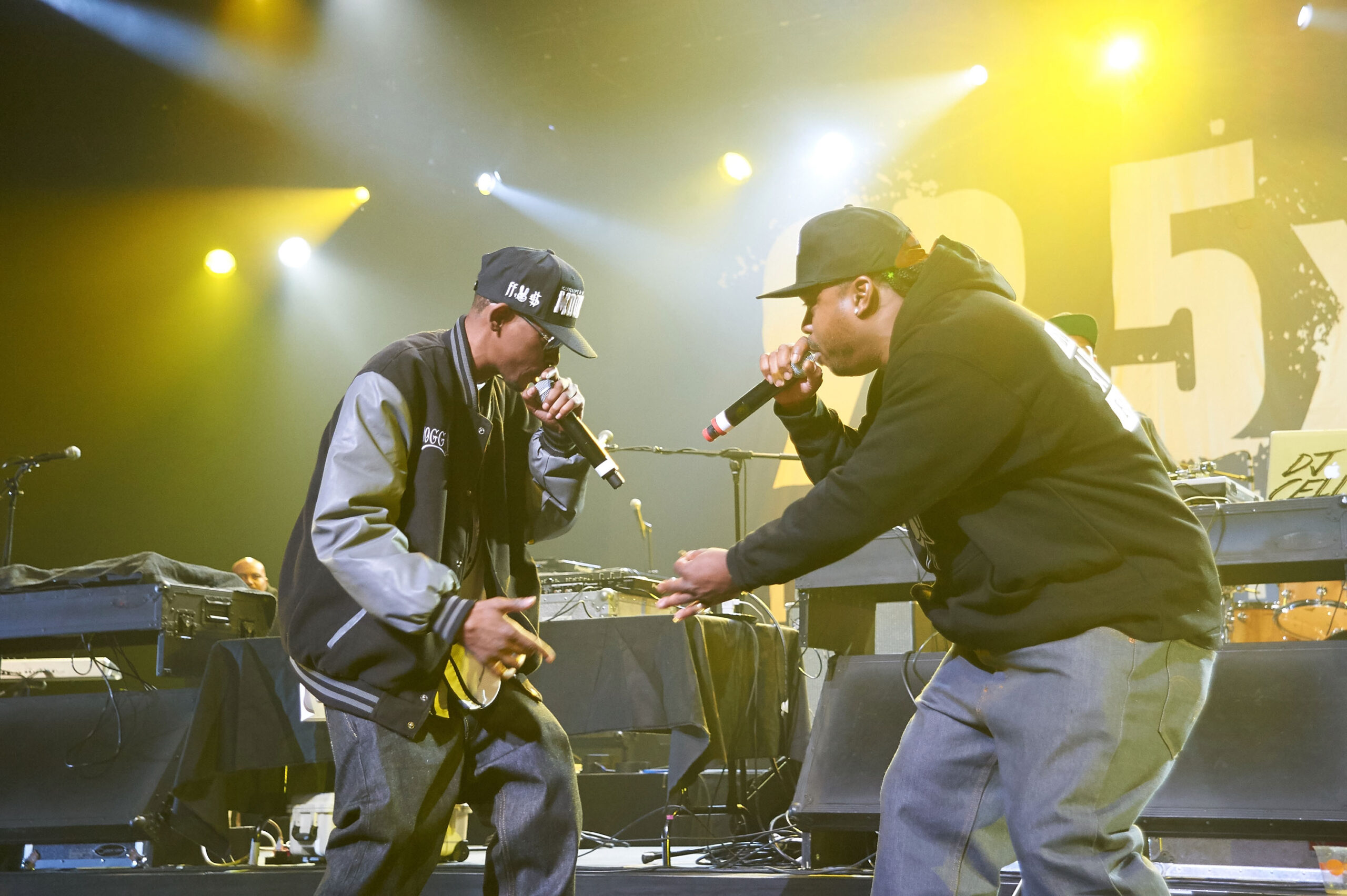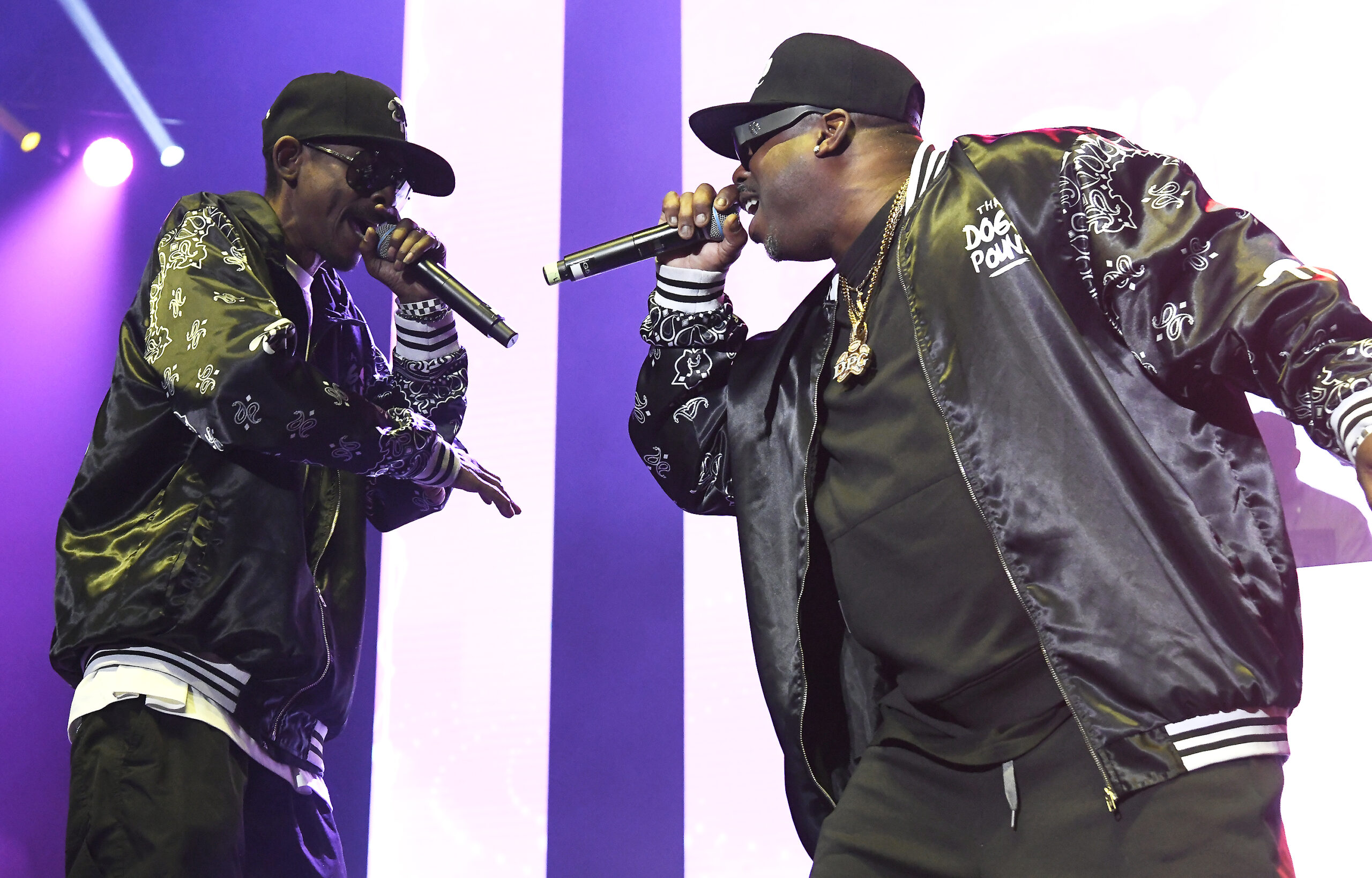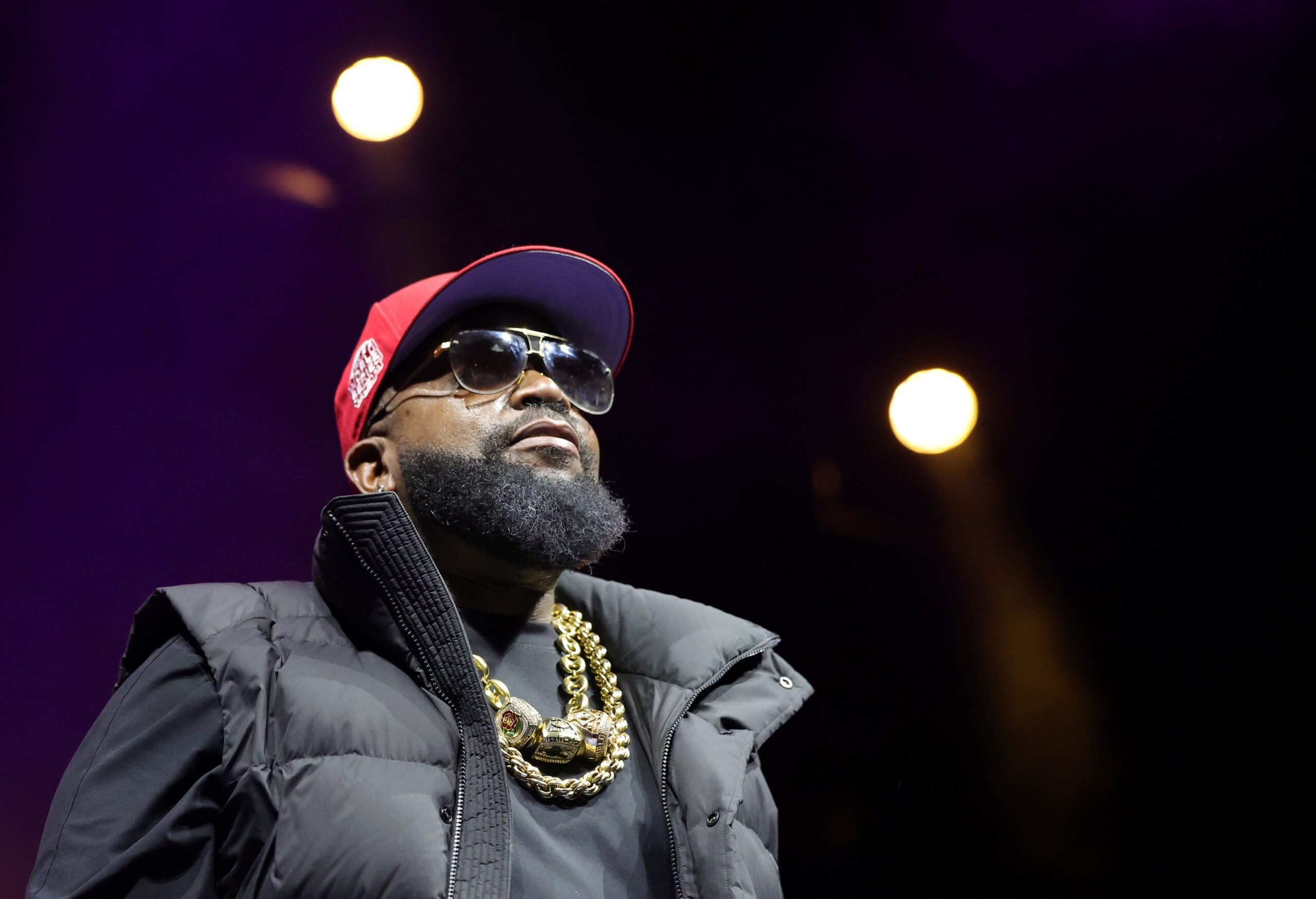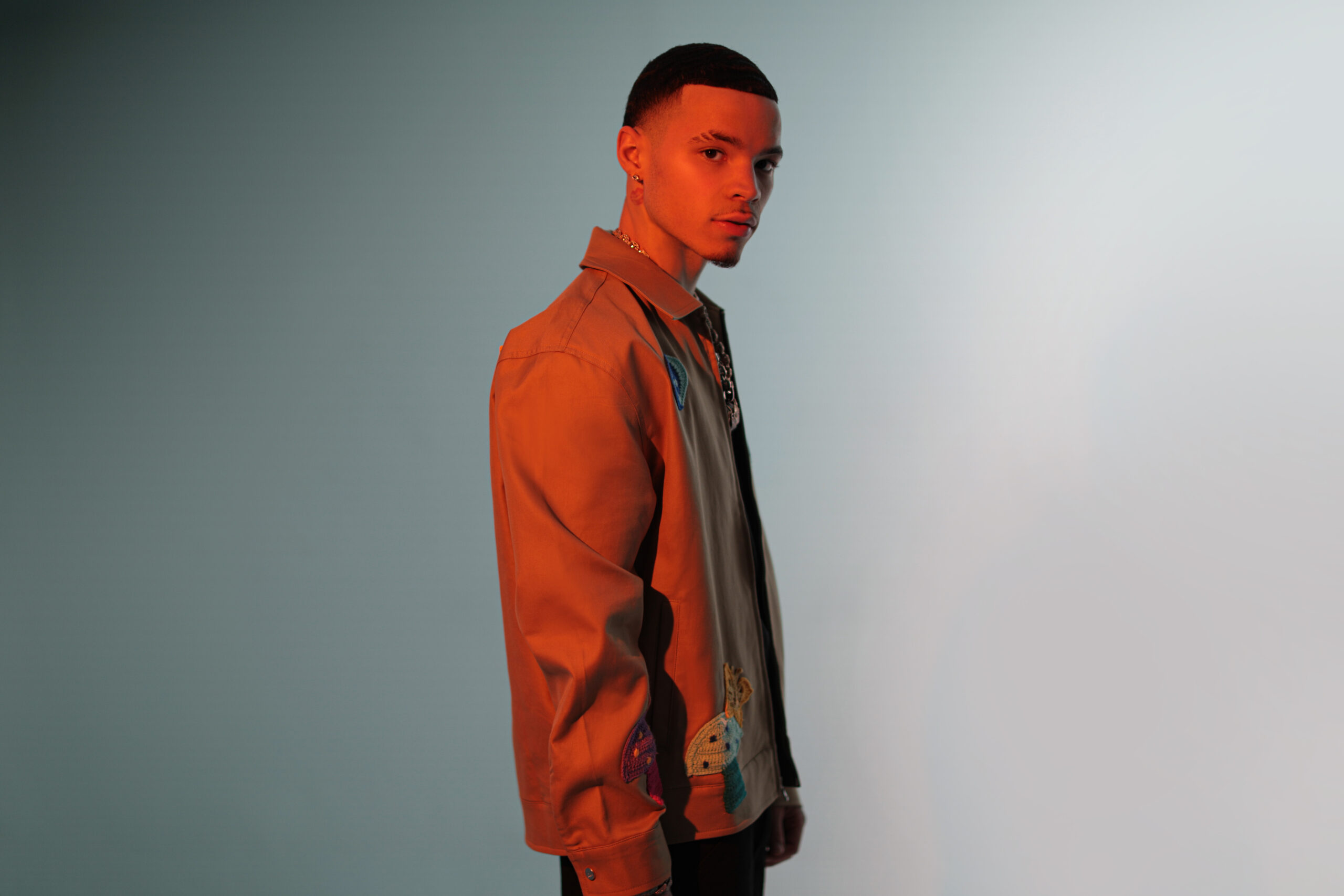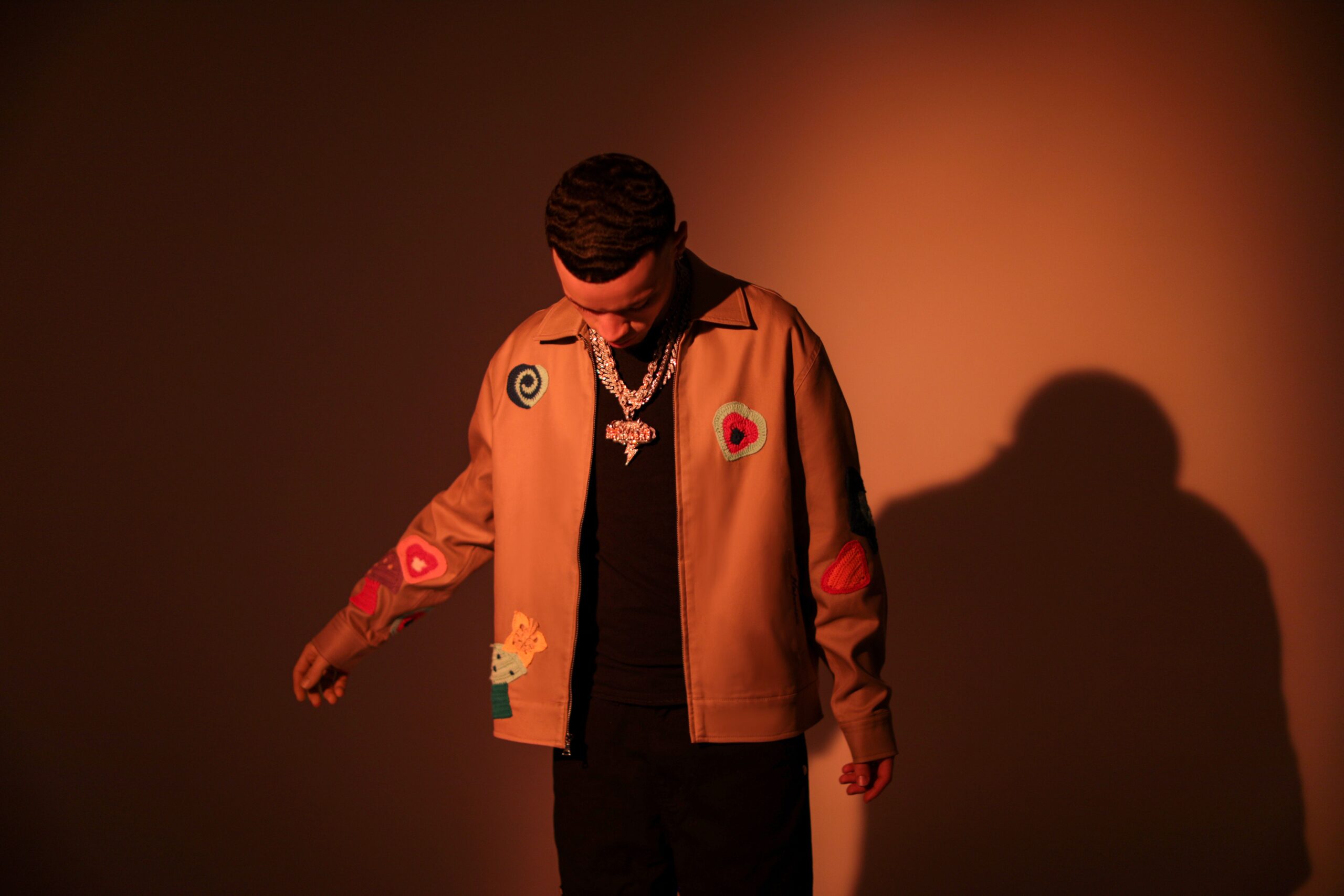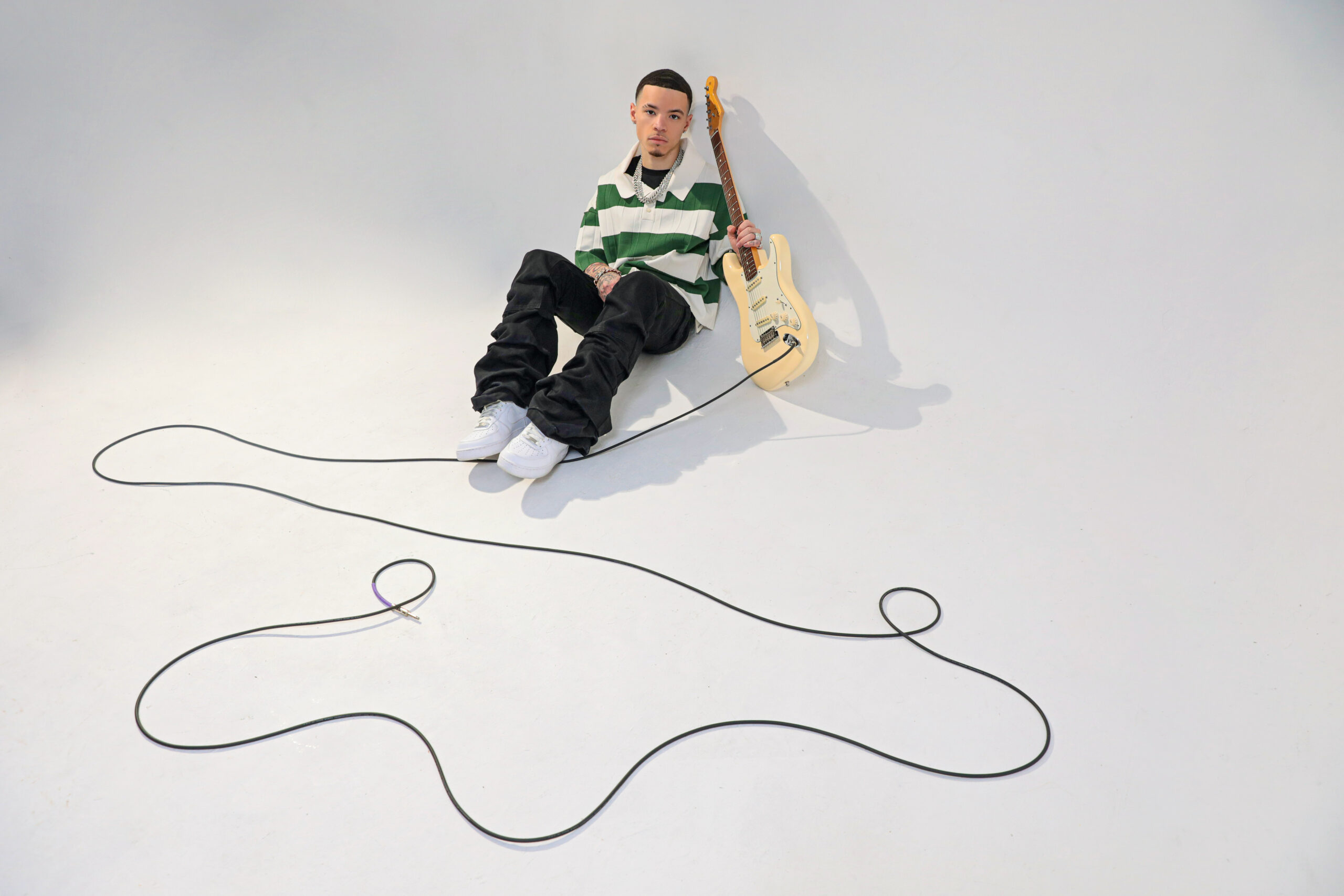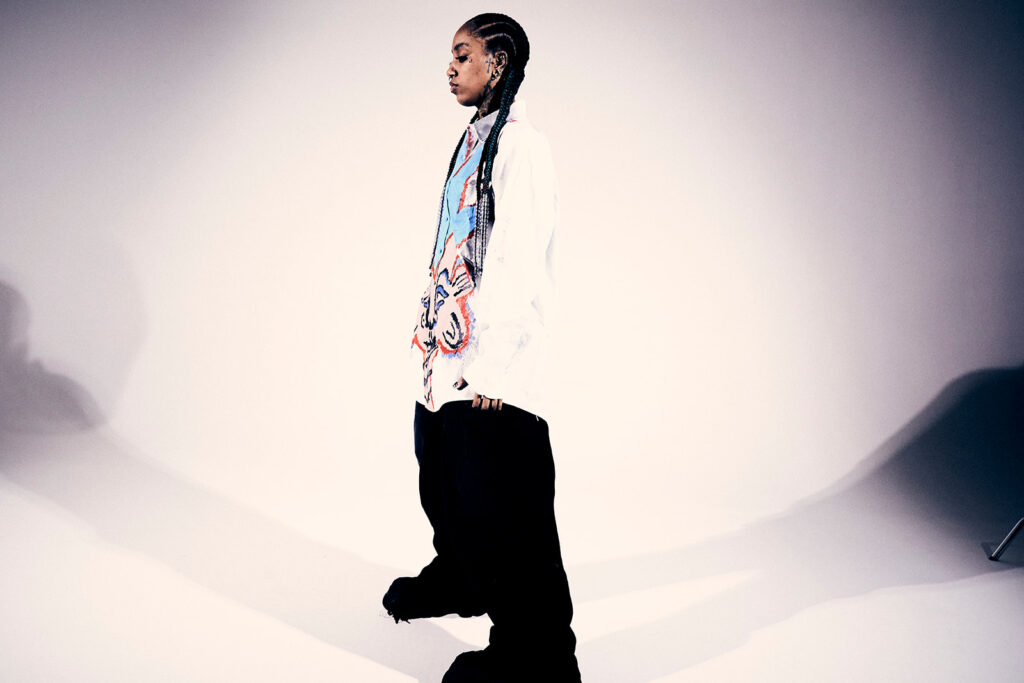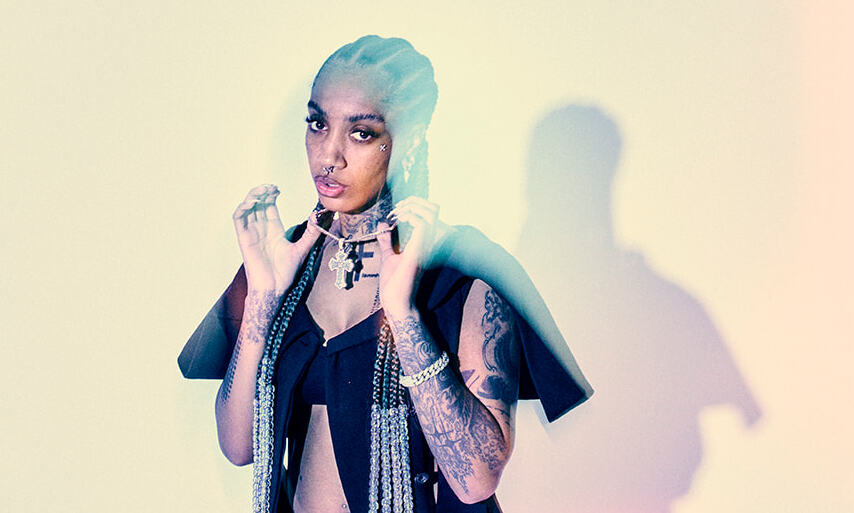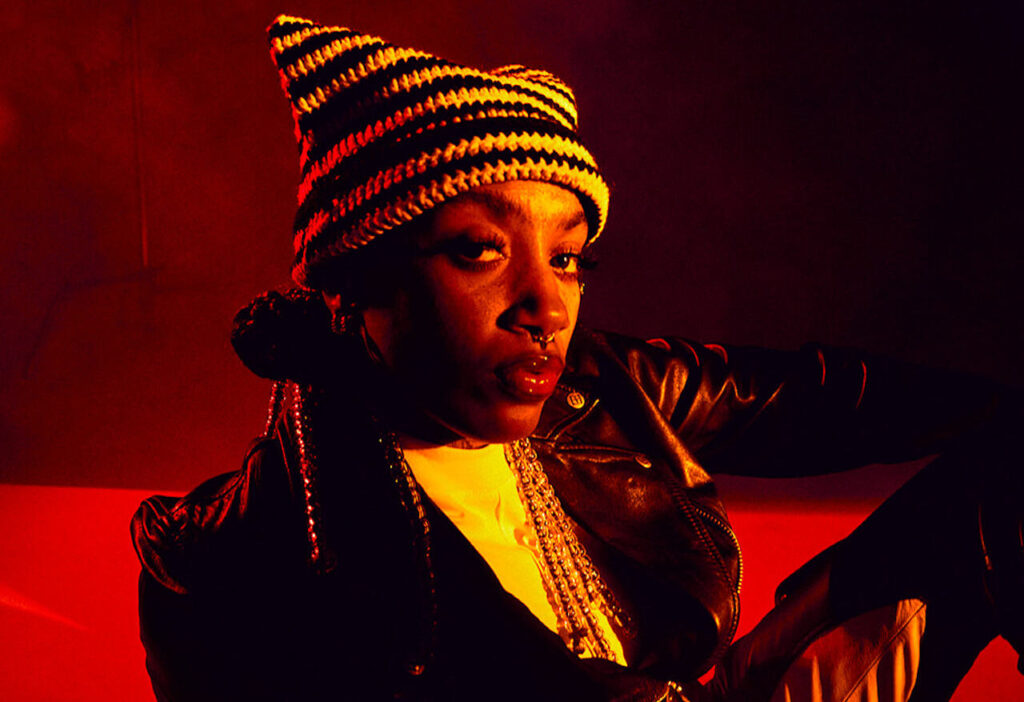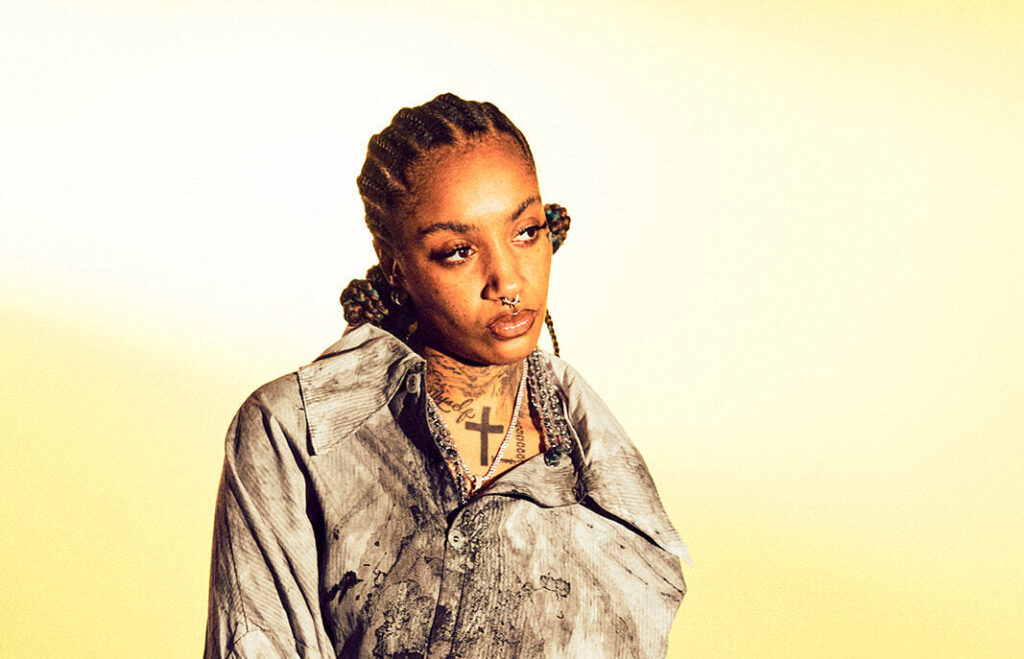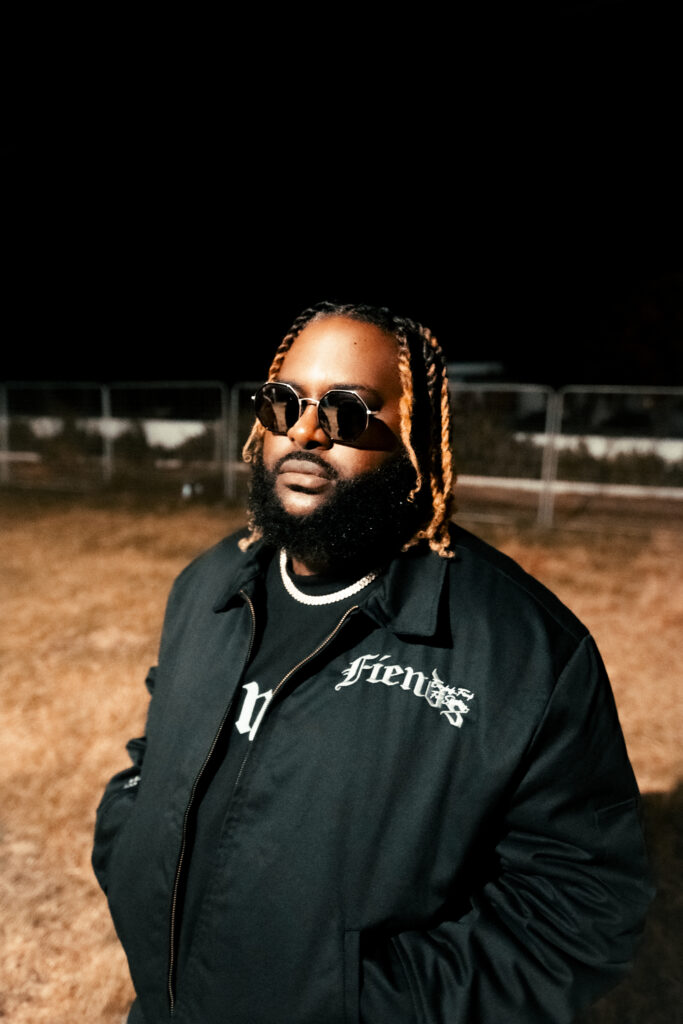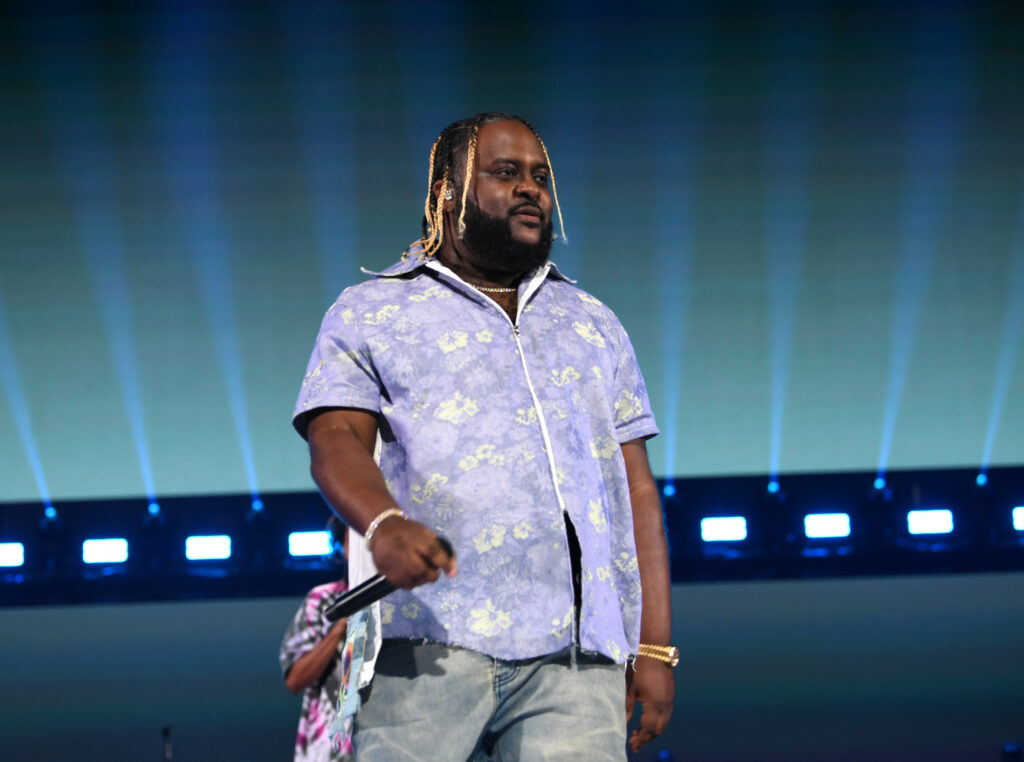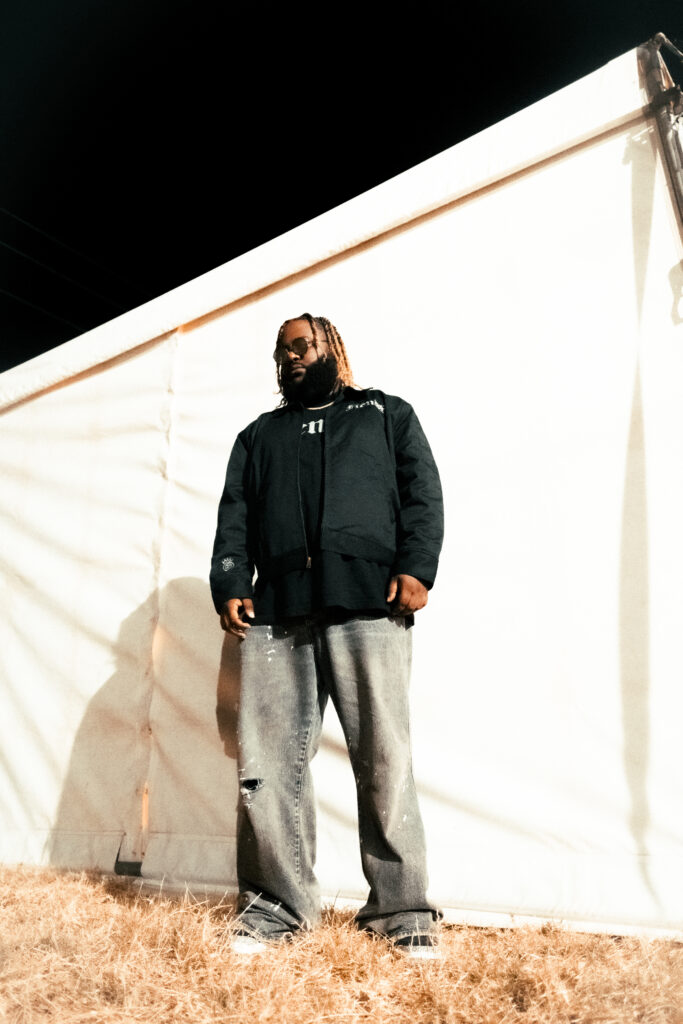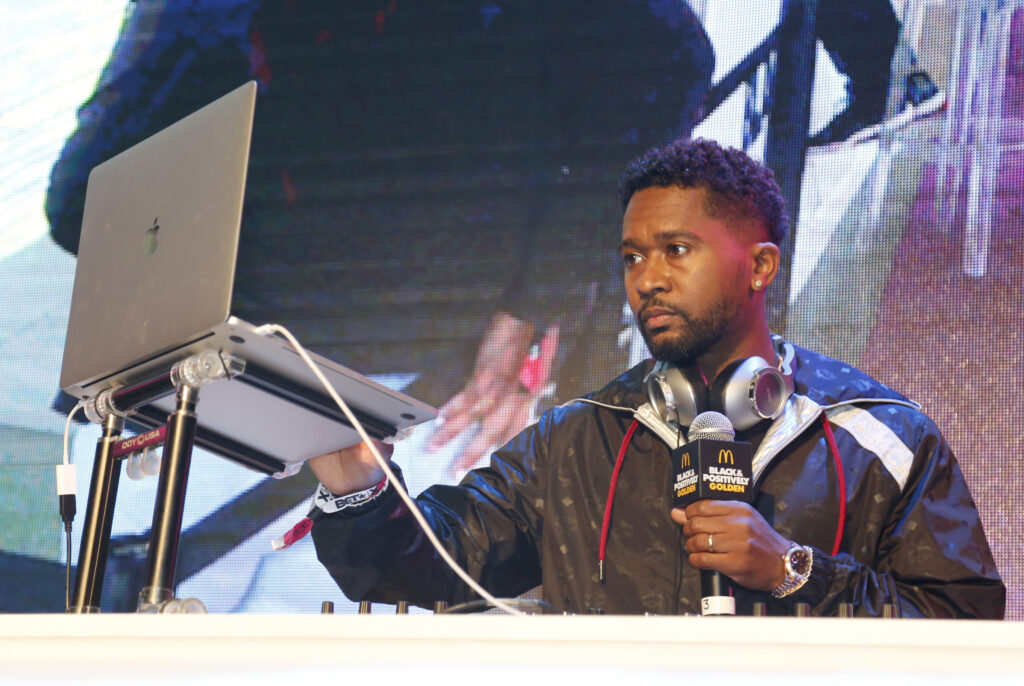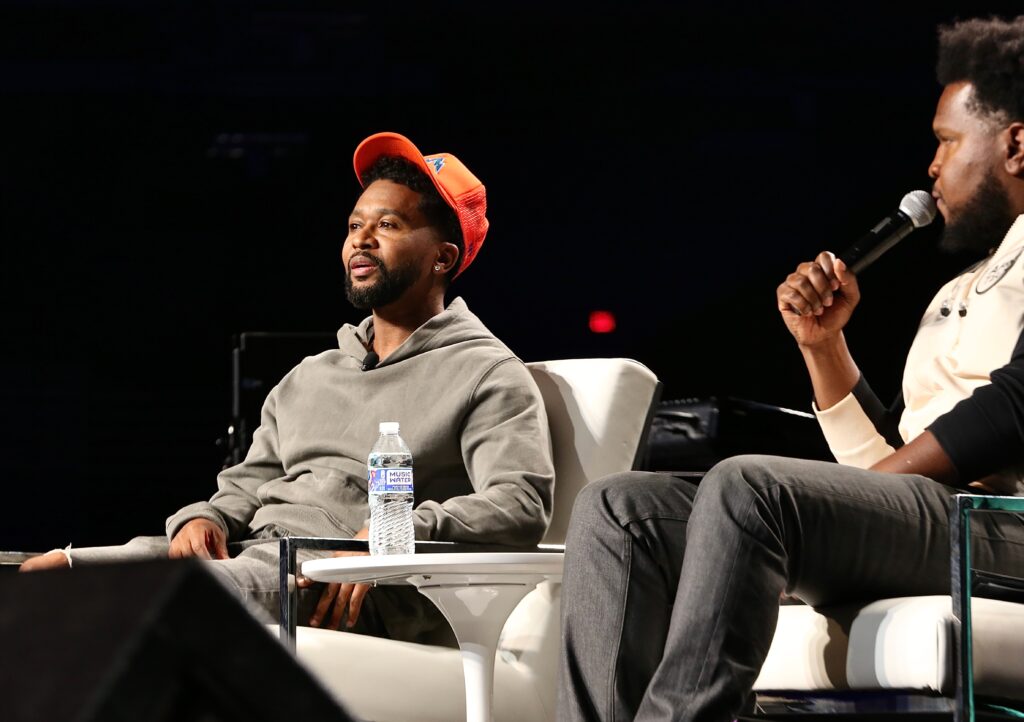When it’s all said and done, the biggest victory in the West Coast’s dominant 2024 run, bolstered by new ScHoolboy Q and Vince Staples albums plus a fiery yet unitary Kendrick Lamar beef, might just be the slew of new artists that emerge in its wake. Devin Malik is leading that charge with a big smile on his face and one of the most versatile sets of talents and sounds you’ll hear this summer. The Philly native was raised in Southern California’s Inland Empire, and made a name for himself by producing for artists like Isaiah Rashad, Amindi, and most recently Q on his album BLUE LIPS. Now, this unpredictable and uncompromising sonic career has led to one of the most hard-hitting and creatively malleable albums of the year so far.
DEADSTOCK is Devin Malik’s new record, bolstered by bouncy singles like “BACKSTAGE” and gritty teasers like “LINK DUCKER.” On it, he speaks on his turbulent and self-conscious navigations through the music industry, his grounded lifestyle with way too many overzealous women in it, and his continued focus on representing all the different parts of his upbringing in as vivid and varied of a painting as possible. It’s vibrant, zany, wall-to-wall fun, and refreshingly risky. In this exclusive interview with HNHH, Malik discusses witnessing K.Dot’s “Pop Out” earlier this month, the many lessons he’s been blessed to learn, and his next ambitions as a sonic director, filmmaker, and potential computer scientist. You don’t need a doctorate to hear the wealth of ideas and approaches he brings to the table.
This interview, conducted via Zoom call on Monday, June 24, has been lightly edited for brevity and clarity.
The HNHH Devin Malik Interview
HNHH: Devin, thanks so much for being here! I wanted to start by asking about what you’ve been doing these days waiting for DEADSTOCK to drop. Are you ironing out the finer details, trying to celebrate early, or just going about your day as usual?
Devin Malik: Honestly, I’m definitely not celebrating. I’m not one of those types of guys that I want a big glory rush or something. *laughs* But I’ve been really just still in the studio, just doing normal everyday things. Obviously, like interviews and whatnot, doing the rollout and that kinds of stuff. But my days look pretty much the same, man. Wake up, hit the gym, hit the studio, go to bed.
I took the title DEADSTOCK to maybe mean a couple of different things. Mainly, I think of unsold inventory being discontinued for whatever reason, but I also think about farm tools or meat products as opposed to livestock. Not to spoil the album too much, but can you talk about why that title in particular kind of resonates with you and whether or not you also looked at it through different ways on the project?
You hit it on the note with the first one. It’s hard to find, rare, discontinued. I just feel that way as an artist because I get so many different flavors and genres on this project that I feel like it’s a lost art in today’s artists. Like, they find one sound that works and they just abuse it. Which I’m not mad at, but I just feel like I’m in a rare bracket. That’s why I really named it that, honestly.
You described DEADSTOCK on social media as “an audible horror film” with “lust, rage and comedy.” Even though that obviously comes off a lot in the production, I feel like your vocal delivery was also a big part of that on the album. Outside of your musical inspirations and knowledge, what else inspired you within film or other art forms in terms of how you used your voice on the album?
Well, I’m a Blumhouse guy. For people that don’t know that, this guy named Jason Blum, he runs a production company, Blumhouse. They do all types of horror films, like f***ing Split, Happy Death Day… I’m drawing blanks right now, but they do a lot of that. So I draw a lot of inspiration from that and just, like, how his mind and how their whole operation runs. I’ve got a lot of inspo from that, for sure. And I put it into my music somehow, in stories I tell or even little effects I use in the music.
Going off of the “comedy” description, do you have a funniest bar on the album or a moment in particular, while you were recording it or during the creation of it, that prompts that comedic description from you for the album?
Honestly, I’m just a very, very funny guy and I’m a funny, strange guy in general. So I just wanted to put that across into music. I don’t think there’s a specific line, but I feel like there’s always little stuff in there that kind of makes it funny because I don’t want to be serious all the time. So it’s not like I even went in with that intention, but when I listen to the album back, there’s definitely some comedic relief in here in some of these weird stories.
Especially with a lot of the romantic angles that you present on songs like “STRIPPERS” and “MOONLIGHT,” I feel like there were some funny jabs in there.
*laughs* Yeah, “MOONLIGHT” is a funny one for sure, that whole song.
You started off selling beats and working with Isaiah Rashad, Amindi, REASON, ScHoolboy Q, all these great artists, and I always find it interesting when the rapper-producer gets to flex both muscles in a way. Since you started taking your own raps more seriously, have you noticed that you’ve changed your production approach or think about the processes of producing and rapping differently? Or have all these things just always been in your head?
I wouldn’t say I changed my approach. But I definitely know what I personally want out of the music. So making it my own project, rather than producing for others, I have complete creative control over my own vision rather than it being predicated towards someone else’s sound, or obviously, whatever they’re trying to get across. It’s kind of easier for me, because I don’t need anyone to talk to. I don’t need anyone, it’s just complete tunnel vision. So I kind of enjoy it more, in a way.
In an interview with The Nuance, you said that your production style really depends on what your other collaborator wants, or what you agree upon together. On DEADSTOCK, you apply that mentality to the different sides of yourself. Do you feel like you have a signature sound for yourself that you want to prioritize moving forward? Are you still excited about molding yourself to different approaches and genres and still having that versatility?
I don’t think I’ll ever have, quote-unquote, a particular sound because I just get bored too easily. So the next one won’t sound like the next one, or like the next one. But what I have learned through this process is just finding a particular tone of voice that I really like. And I think that was the hardest part about all of this and making this.
On a quick note, during that same interview, you also hinted at maybe completing your computer science degree one day. Is that still a goal for you? Are things too busy right now?
*laughs* Things are 100% too busy right now. But I be trying to knock out a class here or there when I can. Like, right now, I’m in two classes, but all online. So, on some summer-type s**t. But yeah, I definitely still want to do that. Whether it takes me ten years, five years, 15 years, it’s just something I really want. I still love computer science.
As I understand it, you’re now officially signed to TDE as a producer after having worked with so much of the team for so long. What do you hope to learn the most from this process? What excites you about being able to contribute to the label’s artistry and sonic directions?
Honestly, I just really want to learn the business side of music. That’s been my whole goal now and being signed is definitely easier. Just in the rooms you’re in and the comments you get to hear, so I just pick up on a lot of s**t just listening. So that’s a big plus. It’s just exciting every day, because these are the artists I grew up listening to and appreciating. So being able to be in the same room, there’s just so much to learn in that and so much excitement in that. So I think it’s really as simple as that. Just whatever I can do to help them push their vision, or whatever I get from it, it’s really just a plus.
You’ve spoken a lot about how your cousins in Fontana broke you into the music space and how you learned from them. What do you appreciate the most about being able to start your artistic process not just with fellow artists, but with these fellow artists that are your family?
Well, yeah, that was a plus. Number one, no one is looking at you like some type of dollar sign. It’s truly like a genuine connection with your family. So learning from them, I’m very grateful for that. In the sessions I got to be in, I literally got to see how how you record music. Like, in the most literal way, I got to see how you interact with different producers, how you interact with the artists, studio etiquette, all that type of stuff. So I owe it all to them for sure for that.
You sold your first beat to D. Savage when you were in high school. Looking back at that process of sending out beats and everything, what’s one thing about said process that you didn’t know back then, but that you learned further on that you would’ve wanted to keep in mind in those early days?
I would say that trying to link with an artist is a lot more important than just sending beats all day. Like, sending beats all day is going to get you the connect to get to them. But once you do that, you should really try to build an actual bond with them. Like, not on no weirdo time, but just a genuine connection with them and try to build some sort of work friendship.
Juxtaposition and not getting boxed in are some of the most important things to you in your artistry and on DEADSTOCK. For this album specifically, how did you balance that process of the different types of emotions you wanted to engage with and what sounds you wanted to play with? How did you stay tapped into all these different parts of yourself while still organizing them into an album that feels more cohesive and intent-driven?
When I was making it, I wanted to go half melodic and, like, half bangers. But I also wanted to sprinkle in, like… It’s different stuff that you can’t find anywhere else. I think it’s a couple of songs on there that you literally can’t find nowhere else but there. And that was really important to me when I was making it. ‘Cause it’s so easy to make, like, fun songs and stuff to get the people hyped, the crowds hype. But I also wanted to give something that was kind of more intriguing or something that people might not get or might hate. I find a lot of power in that.
I do want to ask about a couple of lyrics that I caught on my listens. On “GEEKERTOWN,” you rap: “We don’t relate to rappers, they need millions to have fun / We don’t relate to actors, can’t escape the roles they love.” Now that you’ve seen how the hip-hop and music industries move on a lot of different levels, what are some of the mistakes or misconceptions about artists and celebrities that you want to try to avoid that you see your peers fall into?
Well, for the first line, I was really referring to the real people I know that will fly a girl out to where they’re at, take her shopping, take her to a nice dinner, get her a purse, just to have sex. Like, $8,000 just to have some sex. To me, I never had to do none of that. I could take a girl to Wendy’s, we could go to the movies… $30 and something hot at the end of the night. *laughs* That’s what I meant by that. It’s just a lot of extra stuff just to, like… I don’t know. I don’t know, they just be weird sometimes.
Then the second line, that was just another play on f***ing Hollywood, bro. I was at this party. I’m not going to name the actor, but it’s a dude that’s from the suburbs and didn’t grow up being a tough guy or nothing. But at this party, he’s trying to get in fights and be the toughest guy in the scene when, really, nothing was happening. It was a role he played in a movie where he was a tough guy. So I was like, “I wonder if he just can’t escape that reality. That role or that movie.” That’s really what it was.
Did you approach tracks like “GEEKERTOWN” with a topical focus in mind? You mentioned that sometimes you will freestyle on your beats, and then that will get the creative ball rolling. But were there any ideas that you specifically wanted to make a statement on?
Man, I wish I could say it was more of a statement. But it was definitely just free-flow thought, and that’s just what I was on that day.
I wanted to briefly touch on BLUE LIPS a little bit, because I found some sonic similarity between DEADSTOCK and some of your raw and stark productions on that album. Did you feel a creative overlap between your work on these distinct projects? What was the most different aspect about your approach to them?
There may be creative overlap. There’s nothing that I noticed, but it’s probably subconsciously. Like, anytime I work on a project, I just try to do a better job and get better every time. So there’s definitely overlap, but it wasn’t like a purposeful overlap.
You’re a proud moshpit starter, as you mention in a couple of songs and on your social media. Can you remember your first moshpit and speak a little bit on why that specific aspect to live music captivates you so much?
Yeah, I think it was 2017 or ’16. I can’t remember. But it was a Travis Scott show at The Observatory in Santa Ana. And I think whenever they dropped Huncho Jack, forgot what year it was. But whenever, that was the first, like, “Damn, this moshpit is crazy.” I actually passed out during the show. *laughs* There’s still a picture of it somewhere. But yeah, I was like, “Damn, that is intensity.”
What kind of energy do you want to create with your live shows? Considering that you have so many different sides of yourself, do you hope to bring that energy to people?
Definitely with these songs, there’s going to be plenty of moshpit moments. But I’m definitely like, “Okay, we moshpitting now and now I want y’all to hear this rap. Now I want you to hear me try to sing on this stage, to tone it down.” Like, talk to the crowd, tell jokes, all that type of stuff. My shows are going to give the people, like, make them a part of the show, too. Instead of just watching me with the camera, like, really interact with them and get to know them.
What are you looking forward to concerning performances in the future?
I’m about to open up for Q on his run. So I’m going to have the opening set on there. That’s going to be my first real go-around. I think I’ve only done four shows.
Obviously, since we’re talking about live shows, I’d be remiss not to mention “The Pop Out.” It seemed like you had a great time and something that you said you’re still riding the high off of. As both an artistic collaborator with these people and somebody who’s been a longtime fan for so many years, what excited you the most about that chance to see all of them share the stage and celebrate each other and the West Coast?
Well, yeah, the energy was just next level. You really can’t even put words to it. It is definitely a full-circle moment in my life, almost validating towards what I’ve been working so hard to do since I’ve been 14, 15 years old. Yeah, it really just resonated with me. I’m just glad I didn’t stop making music or get discouraged or quit, none of that. Just continued following my path. And then to see them, those are just the homies. To see them do this at such a high level, it just also shows the levels you can still get to by just working on your craft. They show it’s possible. So seeing all of that, just left with endless inspiration.
What is the quality or the philosophy that you want to add to the West Coast canon and legacy? If at all; I don’t want to box you into this West Coast thing, either. But what thought have you given that?
Maybe just to hopefully show people that you can make different types of music. If you’re from the West Coast, there’s always going to be West Coast elements in your music, 100%. Even in some of my music, stuff that you probably can’t even hear. There’s definitely some West Coast flair in it. But I hope, at least, what I’m trying to show is that you can make different types of music and still be considered a West Coast artist without the typical West Coast sound. You’ll still get West Coast respect. That’s honestly what it shows me when you see people up there like Tyler and Steve Lacy. Those aren’t typical, like… You wouldn’t even know they’re from the West Coast, honestly. But they’re West Coast legends, if that make sense.
Yeah, there are some songs like “PDA” where you can hear that more explicitly with the percussion pattern and other breezy moments. “STRIPPERS,” “ANNOYING”… You don’t always need the Mustard beat.
Yeah, and I love all West Coast artists, too. I want that to be known, too. I love all the West Coast artists, too, for sure. I’m listening to that, and I’m sliding around and moving around. So I’m not trying to diss them, but I was just trying to say what I’m trying to do.
Another track with a little bit of that energy to it is “POPPIN OUT THE RANGE!” which is an absolute banger. You rap: “We was running from the cousins we was trying to be / Escape the pain, escape the rain, escape the leash.” Even though you’re always moving forward in your artistry and in your life, how has your artistic process helped you reflect on your past years? Has it taught you anything unexpected about yourself?
I’ll say that making music, as far as putting my vocals on wax, it’s definitely just helped me cope through different situations of life. Because I usually keep a lot of stuff boxed in, but it’s just freeing saying things. And I don’t like talking to people, like, telling them what I’m going through. So I’d just rather put it in a song. That is the therapy for me.
You talk a lot on DEADSTOCK about navigating the industry, fickle females, and folks with vices and problems that they can’t even really understand. But it still feels like you’re enjoying the process and this point of your career. As you say on “WASTE NO TIME,” you can’t waste time on anything. What’s been the hardest thing for you to kind of like navigate in the industry? How do you think that this new album has helped you do so?
The hardest part is just… I guess just the social aspect and having to deal with so many types of people and personalities. You’re almost living so many different lives, it kind of gets draining. That’s lowkey a thing, a big theme of it. But like you were saying, another big theme of it… You said it sounds bubbly and stuff, but I think I constantly did that because I’m just a guy that laughs through whatever. So kind of just laughing at your pain in a way. It could be a fun song, or it could be a lyric that will make you turn your head, but like, it’s a fun song. So I’m kind of just laughing at pain.
“BIG SHOT” was my personal favorite track off DEADSTOCK. The world you build on that song sounds cold, but it’s also kind of perseverant. You talk about settling scores, final destinies, and seeking that balance between the many different aspects of the album. Why do you think that song sounds so different to everything else on the album? Did you have a moment where you knew that it would be the closer?
Well, thank you for that, that’s one of my favorites, too. Actually, that was a song I was making for Rihanna. They didn’t want that s**t. So I had to finish it. Then, I added guitar and all of that on top of it. But yeah, it’s a special one. Like, it wasn’t like a moment where I’m like, “Damn, this is the closing to the album, this is my outro.” Because when I create, I make 25, 30 songs and I just pick from them. It was definitely one that just sticks out sonically, so I’m like, “I got to fit this on here somehow.” And in the sequence, I felt like the only place it was just perfect for was the outro. I don’t think you’ll forget an outro like that, so I just had to throw it as an outro.
How much do you revisit beats? Many say that writing is rewriting, writing is editing. Do you feel that with your productions as well?
Usually, if I make a song, I’ll know immediately when the day is over if I want to add something or if I want to go farther in it. I think that was one of the only… There might have been two other ones that I went back in on. I was just making the whole beat, sequence the whole beat first. Then, everything will be in order. But that one I just felt like there was something missing, so I threw the guitar on there.
Yesterday, you teased a mystery feature on DEADSTOCK via an Instagram Story [which we now know is ScHoolboy Q on “BANG YOUR HEAD”]. To manifest real quick, are there any other dream collaborations that you have in mind?
I think when it’s all said and done, I just must work with Tyler, The Creator and I must work with Kanye West. If those two things could happen, I guess I’ll have really done it all with this music s**t. Those two things can happen one day, so I’m crossing my fingers.
Fingers crossed. Devin, I just wanted to thank you so much again for your time and for this wonderful convo. Now that you’ve built up you know such an amazing run this year alone, building off of all your past success, what else is inspiring you right now other than yourself to keep doing what you love?
Honestly, now I just want to show the world my ideas visually. So I’m going to be 10 times more hands on in my visual representation. Hopefully, to be able to land something with like, a Blumhouse or a f***ing A24. Because I know that I got all the weird ideas.
What is something or someone you would call “day one” that you are grateful for being in your career up until know and that you think is going to stick with you in the future?
S**t, my brother. He helps me a lot with this music. I send everything to him, most ideas I have, I just run it by him. I’m grateful for that guy.
Is there anything else that you want to add anything else, a shout out, a message before we head on out?
I think I’m good, man, I appreciate your time.
The post Devin Malik Talks New Project “DEADSTOCK,” His Artistic Development & Working With TDE appeared first on HotNewHipHop.

